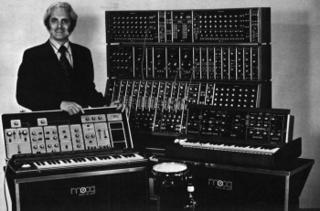
(A few weeks ago Robert Moog passed away. Being a huge fan of synethesizers you can
not avoid Moog's impact on what could be done with electronic instrumentation. He had
more influence than anyone else and his Moog synths happen to be the end all, be all
for me and many other electronic music fans. I wrote this piece earlier in the year when
the documentary Moog came out and wanted to post it here on Cinerobot. Enjoy and
long live the Moog synthesizer!)
I'll admit it: I'm in love with a machine. It's a love affair that has lasted over twenty years
and began one early teenage day when I watched a group of men from England stand
behind a bank of synthesizers. They pressed keys. They twiddled knobs. Waves of
electric sound erupted from their machines. I was awestruck.
The man who did more than anyone else to give birth to the modern analogue synthesizer,
Robert Moog, is the subject of a documentary recently released on DVD. Moog (pronounced
like rogue) began making modular synthesizers (he coined the phrase, meaning a synthesis
of previous ideas into one instrument) in 1964, but these early synths were huge systems,
that due to expense, few people could afford. This changed with the introduction of the minimoog
in the late 1960s and early 1970s. The minimoog, and its variations, helped usher in modern
electronic music as young musicians were able to afford the smaller, more mobile synths.
Soon, artists such as Keith Emerson and Rick Wakeman were performing extended prog-rock
solos while German band Kraftwerk were showing what analogue synthesizers could do in a more
traditional pop song format.
When I hear good electronic music created with analogue synthesizers I think I am hearing
music from the future. To see a person standing in front of a machine that takes up half a
wall, cables and wires plugged in everywhere, notes surging from the keys--this is an
exhilarating thing for me. It is the sound of the future, of science fiction and of the unknown.
Robert Moog is the mad scientist creator of the possibility of such a sound, and to paraphrase
Moog at one point in "Moog", to play a Moog synth is like being a current of electricity inside
a machine. It's that idea that makes analogue synthesizers so fantastic. When you play one
you are not playing a string, drum or traditional instrument--you are playing electricity. What
is more futuristic than that?
It is that futuristic element that people thought was so frightening when the Moog synth first
came into being. Moog states in the documentary that traditional minded musicians and the
general public thought of the synths as "harmful" and possibly ruinous to the future of music.
It took until the late 1970s with bands emerging from the punk rock aftermath to spread the
synthesizer sound to a more mainstream, youth friendly pop market. In England bands such
as Fad Gadget, Human League, Depeche Mode, Gary Numan (the huge sweeping notes on
"Cars" are from Moog synths), Orchestral Maneuvers In the Dark and John Foxx, as well as
the Japanese band Yellow Magic Orchestra were at the forefront of a new electronic music.
Current bands such as Toronto's Solvent and England's Ladytron are examples of the usage
of the instruments in the 21st century. Virtually every dance band on the planet uses it in
some shape or form to create its grooves. The analogue synthesizer is such a key instrument
now it will never disappear and hopefully will retain its futuristic quality.
The documentary is a short (72 minutes), bare bones affair that comprises interviews with Moog
(who often does not look comfortable on camera), old footage of the early days of his work,
interviews with other people who love the instrument and live footage of bands playing various
Moog synths (Stereolab, Money Mark and Mix Master Mike, Keith Emerson, Rick Wakeman
among others). I loved that there were theremin bits (an instrument played with the magnetic
fields of electricity--you literally play air when playing a theremin, think "Good Vibrations" by the
Beach Boys) in the film. I personally would have loved more old footage and live performances
to at least push the running time up to 90 minutes but am just happy to see anything about Bob
Moog and his groundbreaking Moog synthesizer. When you are in a lifelong love affair, like I am,
any amount of time will make your heart happy. If you see this, maybe you'll too fall in love.

2 comments:
long live the moog!
electricity makes it possible!
So the Einstein of electronic music passes away. I wander of his own music was played at his funeral.
Post a Comment